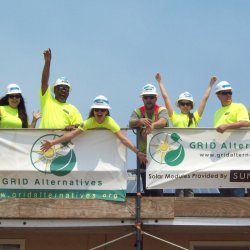GRID Alternatives launched its nonprofit solar installation and solar jobs training program in the Antelope Valley in partnership with the City of Palmdale, the University of Antelope Valley, and a SunPower sponsor team. On Thursday May 16th, GRID completed two solar electric installations for Palmdale low-income homeowners, Marsha Furman, and Cynthia and Benjamin Leh (read the KCET ReWire article on the installations here).
Marsha Furman is a widow relying on her social security to get by. As a very low-income homeowner, she appreciates any assistance in meeting her monthly bills, but the solar electric system GRID installed, combined with GRID's recommended energy efficiency measures, can reduce her energy costs by nearly 100%.
Students from the University of Antelope Valley's Sustainable Energy program came out and installed Ms. Furman?s system alongside their class instructor and a GRID Alternatives Solar Installation Supervisor. Robert Heath, an Antelope Valley student who participated on the install, told the Antelope Valley Times, that the hands-on experience he was getting with GRID was critical. "You can read about it and do the book work, but you have to actually do it to learn it.? Robert got in to solar ?because it?s a growing industry and Lancaster is going to be the solar capital of the country."
.jpg) One major force behind this solar growth in the Antelope Valley is SunPower, who developed and is currently the contractor for the largest PV solar development in the world. SunPower has worked with GRID Alternatives since 2006 and earlier this year, pledged to provide its high-efficiency solar panels through a combination of donations and fair market value sales to support GRID's work in underserved communities. This new phase of the ongoing philanthropic partnership is projected to generate approximately $4.8 million in energy savings for low-income families throughout the lifetime of the systems.
One major force behind this solar growth in the Antelope Valley is SunPower, who developed and is currently the contractor for the largest PV solar development in the world. SunPower has worked with GRID Alternatives since 2006 and earlier this year, pledged to provide its high-efficiency solar panels through a combination of donations and fair market value sales to support GRID's work in underserved communities. This new phase of the ongoing philanthropic partnership is projected to generate approximately $4.8 million in energy savings for low-income families throughout the lifetime of the systems.
A volunteer team from SunPower's Lancaster area offices came out to help install solar for the Leh family, many of whom had never had the opportunity to get out of the office and work with their own modules in the field, and all of whom enjoyed the opportunity to work together and use renewable energy to support a local family in need (view more photos here).
Also a very low-income family, Benjamin Leh is disabled and has been confined to a wheelchair following a stroke and Cynthia is his full-time caregiver. The Leh's struggle every month to meet their expenses and look forward to their energy cost savings, most especially during the hot summer months.
Throughout the Antelope Valley, heat-related illness and death is a major health threat for elderly community members and for those with pre-existing health conditions, but local low-income families typically cannot afford critical cooling strategies like air-conditioning. The clean affordable power that these solar electric systems will generate will allow Marsha Furman and the Leh's to protect their health in the coming summer while reducing the greenhouse gasses that contribute to higher temperatures, supporting economic and environmental sustainability for the region's most vulnerable families.

